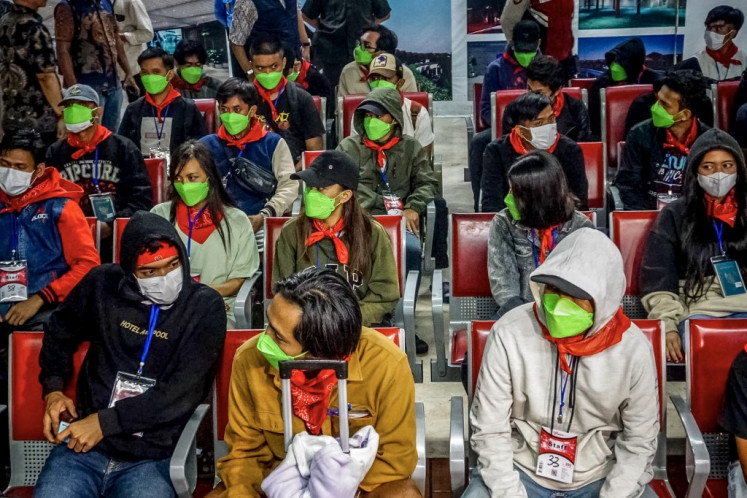Popular Reads
Top Results
Can't find what you're looking for?
View all search resultsPopular Reads
Top Results
Can't find what you're looking for?
View all search resultsIndonesians don’t deserve asylum,envoy says
Indonesia’s Ambassador to the United States, Dino Patti Djalal, says the 72 Indonesians who fled to the US for fear of persecution in their homeland do not deserve to be granted asylum
Change text size
Gift Premium Articles
to Anyone
I
ndonesia’s Ambassador to the United States, Dino Patti Djalal, says the 72 Indonesians who fled to the US for fear of persecution in their homeland do not deserve to be granted asylum.
Dino said on Thursday in Washington DC that the immigrants, who were currently facing deportation, did not have strong grounds to seek asylum as there had been no persecution of any religion in Indonesia.
“We know that Indonesia is a country that supports freedom of religion. People of all religions: Islam, Catholicism, Protestantism, Hinduism and Buddhism have their rights guaranteed by the Constitution. Saying that you feel threatened because of a lack of religious freedom is exaggerating,” he said as quoted by kompas.com.
Dino said he had received reports of the US government’s plan to deport the 72 immigrants, currently living in New Jersey, and advised them to abide by the country’s rules. “If the US asks them to return home, then they have to go.”
According to Rev. Seth Kaper-Dale of the Reformed Church in Highland Park, who was quoted by the Associated Press, the group of Indonesian immigrants, which consisted primarily of Christians, fled from economic instability and religious persecution in the world’s most populous Muslim country in the late 1990s.
They worked, paid taxes and raised families — many of their children were born in the US — until 2003, when a US government program implemented in response to the 9/11 attacks compelled all adult males from 15 predominantly Muslim countries to register with US authorities.
In 2006, US immigration authorities started deporting Indonesians.
Kaper-Dale, as reported by The New York Times, appealed for the Indonesians to be given more time to be able to gain citizenship status through the courts or US immigration law.
Despite Dino’s claim that Indonesia supports freedom of religion, the US recently published a report, detailing incidents between July and December 2010, which revealed that the Indonesian government had “failed” to stop the victimization of religious groups and bring the perpetrators of religious violence to justice.
Quoting a leading NGO that was not identified, the report said there were more than 50 attacks against the minority Ahmadiyah Islamic sect in 2010, and more than 75 attacks against Christians.
The report said discrimination was aimed not only toward Ahmadiyah followers and Christians, but also toward Muslims in regions where they formed the minority.
Wahid Institute director Yenny Zannuba Wahid had previously said the trend of discrimination against minority groups had continued to increase over the past few years, and that more perpetrators of discriminatory acts were now to be found among state actors, rather than primarily non-state actors.
Violence against religious freedom (July-December 2010)
Date Location Incident
July 26-29 Manis Lor village, Members of hardline groups targeted Ahmadiyah followers.
Kuningan, West Java
Oct. 1 Cisalada, West Java Residents of a nearby village looted and destroyed houses, burned a
mosque and burned cars in the predominantly Ahmadiyah enclave.
Nov. 11 North Jakarta A group of students from Dakwah Islam University threatened to close
an Ahmadiyah mosque. Police defused the situation before it turned violent.
Dec. 3 South Jakarta Approximately 50 people attacked the Al Hidayah Ahmadiyah mosque.
No injuries were reported.
Dec. 12 Bandung, West Java Local authorities in Rancaekek, Bandung, in conjunction with
hardlinecivil society groups, forced the sealing of seven houses
belonging to Christians, claiming that they were being used
as houses ofworship without a permit.
Source: The July-December 2010 US Embassy report on religious freedom in Indonesia










